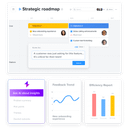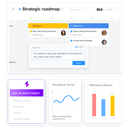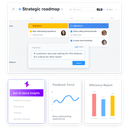Productboard vs Trello (2025 Comparison)

Productboard empowers product teams with advanced roadmapping and feedback tools, ensuring customer-driven development. Its customizable features make it a valuable asset for aligning product strategy with business goals.
- Advanced roadmapping capabilities.
- Robust feedback collection tools.
- Customizable product management features.
- Steep learning curve for new users.
- Higher cost for premium features.
Free plan?
YesStarting price
$19 per month
Trello offers an intuitive interface and extensive integrations, making it a versatile project management tool. Its customizable boards and cards provide flexibility for various project types.
- Intuitive and user-friendly interface.
- Extensive integration options.
- Highly customizable boards and cards.
- Limited advanced product management features.
- Basic feedback collection capabilities.
Free plan?
YesStarting price
$5 per month per userWhat is Productboard?
Productboard is a product management tool that helps teams prioritize features and align them with customer needs. It offers a centralized hub for collecting feedback, creating roadmaps, and ensuring that product development is customer-driven. By using Productboard, teams can streamline their workflow, improve collaboration, and make data-driven decisions. This tool is particularly beneficial for product managers who need to keep track of customer insights and ensure that their product strategy aligns with business goals.
What is Trello?
Trello is a versatile project management tool that uses boards, lists, and cards to help teams organize tasks and projects. It is highly visual and intuitive, making it easy for users to track progress and collaborate with team members. Trello's flexibility allows it to be used for a wide range of applications, from personal task management to complex project coordination. With its user-friendly interface and powerful integrations, Trello helps teams stay organized and productive in their daily operations.
Pros and Cons of Productboard vs Trello

Pros & Cons of Productboard
- Productboard offers sophisticated roadmapping tools that allow product managers to create detailed and strategic roadmaps. This feature is essential for aligning product development with business goals and customer needs.
- With Productboard, teams can efficiently gather and prioritize customer feedback, ensuring that product decisions are informed by real user insights. This capability is crucial for creating customer-driven products.
- Productboard provides a range of customizable features that cater to the specific needs of product teams. This flexibility allows teams to tailor the tool to their unique workflows and processes.
- Productboard's comprehensive features may require a learning curve for new users, particularly those unfamiliar with product management tools. This can be a barrier for teams looking for a quick setup.
- While Productboard offers powerful features, accessing its full potential may require a higher investment. This can be a consideration for teams with limited budgets.

Pros & Cons of Trello
- Trello's interface is designed for ease of use, allowing users to quickly adapt and start managing projects. This simplicity is ideal for teams looking for a straightforward project management solution.
- Trello offers a wide range of integrations with popular tools, enhancing its functionality and making it a versatile choice for teams using multiple platforms.
- Trello's customization options allow users to tailor boards and cards to fit their specific needs, providing flexibility and adaptability for various project types.
- While Trello excels in task management, it lacks the advanced product management features that specialized tools like Productboard offer. This can be a limitation for product-focused teams.
- Trello's feedback collection capabilities are limited compared to dedicated product management tools. Teams looking for robust feedback integration may need to explore additional solutions.
Productboard vs Trello: At A Glance
Value to Price
Productboard offers a robust set of features that justify its pricing, especially for product managers who need detailed insights and roadmapping capabilities. Trello, on the other hand, provides excellent value with its free plan and affordable premium options, making it a great choice for teams looking for cost-effective project management solutions. If budget is a primary concern, Trello might be the better option.
Ease of Use
Trello is renowned for its intuitive and user-friendly interface, which allows users to quickly adapt and start managing projects without a steep learning curve. Productboard, while feature-rich, may require a bit more time to master due to its comprehensive functionalities. If you prioritize ease of use, Trello is likely the more suitable choice.
Functionality
Productboard excels in providing advanced product management features, such as customer feedback integration and detailed roadmapping tools. Trello, while versatile, focuses more on task and project management with its card-based system. For teams needing in-depth product management capabilities, Productboard is the superior choice.
Scalability
Both Productboard and Trello offer scalable solutions, but Productboard is particularly well-suited for growing product teams that need to manage complex product strategies. Trello's flexibility makes it adaptable for various team sizes and project scopes. If your team is rapidly expanding, Productboard might better meet your needs.
Integrations
Trello boasts a wide range of integrations with popular tools, enhancing its functionality and making it a versatile choice for teams using multiple platforms. Productboard also offers integrations, but Trello's extensive library gives it an edge in this dimension. If seamless integration is crucial, Trello is the better option.
Customer Support
Both tools provide reliable customer support, but Productboard offers more personalized assistance, which can be beneficial for teams needing tailored guidance. Trello's support is efficient, but may not be as in-depth. If personalized support is important, Productboard might be the preferred choice.
Security
Security is a priority for both Productboard and Trello, with each offering robust measures to protect user data. Productboard's focus on product management may include additional security features tailored to sensitive product data. If security is a top concern, Productboard could be the better option.
Overall Rating
Trello's overall rating is slightly higher due to its ease of use and extensive integrations, making it a popular choice for a wide range of users. Productboard, while slightly lower in overall rating, excels in specialized product management features. If you need a general project management tool, Trello is ideal, but for product-focused teams, Productboard is a strong contender.
Productboard vs Trello: A Detailed Breakdown of Key Features
Roadmapping
Productboard shines in roadmapping, offering detailed and customizable roadmaps that align with customer needs and business goals. This feature is invaluable for product managers who need to visualize and communicate their product strategy. Trello, while capable of basic roadmapping through its card system, lacks the depth and specificity that Productboard provides. If roadmapping is a critical component of your workflow, Productboard is the superior choice.
Task Management
Trello excels in task management with its intuitive board and card system, allowing users to easily organize and track tasks. Productboard offers task management features, but they are more focused on product development rather than general project management. If your primary need is efficient task management, Trello is the better option.
Feedback Collection
Productboard offers robust feedback collection tools, enabling teams to gather and prioritize customer insights effectively. This feature is essential for product teams aiming to create customer-driven products. Trello, while offering some feedback capabilities through integrations, does not match Productboard's specialized tools. For teams focused on feedback-driven development, Productboard is the clear winner.
Collaboration
Both Productboard and Trello facilitate collaboration, but Trello's visual interface and real-time updates make it particularly effective for team communication. Productboard also supports collaboration, but its focus is more on aligning product strategy with customer needs. If seamless team collaboration is your priority, Trello is the more suitable choice.
Customization
Trello offers extensive customization options, allowing users to tailor boards and cards to fit their specific needs. Productboard also provides customization, particularly in its roadmapping and feedback features, but Trello's flexibility gives it an edge. If you need a highly customizable tool, Trello is the better option.
User Interface
Trello's user interface is clean, intuitive, and easy to navigate, making it accessible for users of all skill levels. Productboard's interface is also user-friendly, but its complexity may require a learning curve for new users. If a straightforward user interface is important, Trello is the preferred choice.
Pricing Comparison of Productboard and Trello
To assist you in making an informed choice, we’ve outlined the pricing plans and essential features of Productboard and Trello. This comparison will highlight the best option for managing your projects and product development.

Productboard Pricing Plans
- 1 Teamspace for collaborative work management.
- 1 Objective to align team goals effectively.
- 1 Product Portal for centralized product information.
- Integration with Jira and Azure DevOps for seamless workflow.
- 2 Insights automations to streamline feedback processing.
- Portal moderation for managing customer interactions.
- Feedback loop closing to ensure customer satisfaction.
- Release planning for efficient product launches.
- 3 Teamspaces for enhanced team collaboration.
- 10 Objectives to drive strategic alignment.
- 10 Insights automations for advanced feedback analysis.
- Customizable feature statuses and data fields for flexibility.
- Unlimited Objectives for comprehensive goal setting.
- Strategic planning tools for high-level decision making.
- 3+ Product Portals for extensive product management.
- SAML SSO & Google SSO for secure access.

Trello Pricing Plans
- Up to 10 boards per Workspace for organized project management.
- Unlimited Power-Ups per board to enhance functionality.
- Unlimited storage with a limit of 10MB per file.
- 250 Workspace command runs per month for automation.
- Advanced checklists for detailed task breakdowns.
- Custom Fields to structure information on Trello cards.
- Unlimited storage with a limit of 250MB per file.
- 1,000 Workspace command runs per month for enhanced automation.
- Unlimited Workspace command runs for extensive automation.
- Atlassian Intelligence (AI) for enhanced productivity.
- Admin and security features for better control.
- Workspace-level templates for consistent project management.
- Organization-wide permissions for enhanced security.
- Public board management for broader collaboration.
- Multi-board guests for flexible team collaboration.
- Free SSO and user provisioning with Atlassian Access.
Our Rating Methodology
We thoroughly evaluate each project management tool, focusing on key aspects like functionality, ease of use, and integrations. By analyzing user feedback and conducting hands-on testing, we ensure our recommendations are reliable. Each factor is weighted to provide an accurate final rating, helping you choose the best tool for your needs.
Productboard or Trello: Which One Matches Your Business Needs?
Choose Productboard If You Need ...
- Advanced product management features
If you are a product manager looking for a tool with advanced roadmapping and feedback collection capabilities, Productboard is the ideal choice. Its specialized features ensure that your product development aligns with customer needs and business goals.
- Customizable product workflows
If your team requires a tool that offers customizable product management features, Productboard is the better option. Its flexibility allows you to tailor the tool to fit your unique workflows and processes, enhancing productivity and efficiency.
Choose Trello If You Need ...
- Intuitive project management
If you need a project management tool with an intuitive and user-friendly interface, Trello is the perfect choice. Its simplicity allows teams to quickly adapt and start managing projects without a steep learning curve.
- Extensive integrations
If your team relies on multiple platforms and requires a tool with extensive integration options, Trello is the better choice. Its wide range of integrations enhances functionality and ensures seamless workflows across different systems.
Frequently Asked Questions
 Which tool is better for product management, Productboard or Trello?
Which tool is better for product management, Productboard or Trello?
 Is Trello suitable for large teams?
Is Trello suitable for large teams?
 Can Productboard integrate with other tools?
Can Productboard integrate with other tools?
 What are the main differences between Productboard and Trello?
What are the main differences between Productboard and Trello?
 Which tool offers better customer support, Productboard or Trello?
Which tool offers better customer support, Productboard or Trello?
 Is Trello free to use?
Is Trello free to use?

Martin Lunendonk
Martin Lunendonk is a senior tech writer specializing in website builders, web hosting, and ecommerce platforms. With a background in finance, accounting, and philosophy, he has founded multiple tech startups and worked in medium to large tech companies and investment banking, bringing deep expertise and reliable insights to his software reviews.



